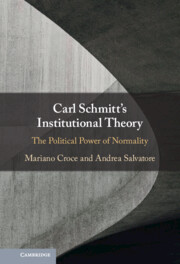Book contents
- Carl Schmitt’s Institutional Theory
- Carl Schmitt’s Institutional Theory
- Copyright page
- Contents
- Acknowledgements
- Introduction
- 1 What Is Exceptionalist Decisionism?
- 2 Looking Backwards
- 3 How Exceptionalist Decisionism Came About
- 4 A Fresh Start
- 5 Out of the Exceptionalist Quagmire
- 6 The Politics of Normality
- 7 Doing Away with Politics
- Conclusion
- References
- Index
3 - How Exceptionalist Decisionism Came About
Schmitt and Coeval Critics
Published online by Cambridge University Press: 23 June 2022
- Carl Schmitt’s Institutional Theory
- Carl Schmitt’s Institutional Theory
- Copyright page
- Contents
- Acknowledgements
- Introduction
- 1 What Is Exceptionalist Decisionism?
- 2 Looking Backwards
- 3 How Exceptionalist Decisionism Came About
- 4 A Fresh Start
- 5 Out of the Exceptionalist Quagmire
- 6 The Politics of Normality
- 7 Doing Away with Politics
- Conclusion
- References
- Index
Summary
Chapter 3 challenges the connection that is alleged to exist between Political Theology (1922) and The Concept of the Political (1927). It claims that this connection was a later construal by Schmitt himself, who self-interestedly recognised its relevance in the light of various remarks by coeval critics. To substantiate this claim, the chapter takes issue with three of the most serious among the numerous contemporary lines of criticism levelled against Schmitt’s decisionism. The first was that the idea of the autonomy of the political favoured an existential irrationalism that could open the Pandora’s box of the centrifugal forces yielded by the political. The second line of criticism, instead, centred on the fact that such a slippery slope could also be the consequence of another feature of exceptionalist decisionism – that is, the fact that it made no room for any normative criterion. A final and more radical critical line contended that in the way it was presented in his canonical texts, Schmitt’s exceptional decisionism did not stand on its own feet.
- Type
- Chapter
- Information
- Carl Schmitt's Institutional TheoryThe Political Power of Normality, pp. 47 - 65Publisher: Cambridge University PressPrint publication year: 2022

